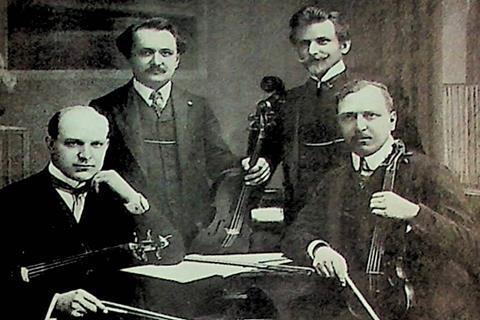Leading performers and teachers share their views on the use of Ševčík today, in this article from September 1998. By Sarah Mnatzaganian

Every string player has heard of Ševčík, but how important is he to first-rank performers? How many of them, for example, used Ševčík’s exercises during their own student days? Janos Starker pleads exemption, protesting, ’I am a cellist!!!’ Victor Danchenko, violinist, explains th his Soviet training based on Henry Schradieck (who was in fact, a disciple of Ševčík), while Felix Andrievsky, professor at the Royal College of Music, did not use Ševčík at all.
Those who did study Ševčík will think of him with gratitude. ‘Ševčík helped me with my double-stops.’ Itzhak Perlman remembers, though he does not use Ševčík in his own practice any more. Rodney Slatford used a ‘private arrangement’ of Ševčík when he was a student, finding the exercises for articulation and bow development particularly helpful, though likewise he does not use them now. Violist Kim Kashkashian, however, still uses excerpts from the School of Bowing Technique Book 1 to improve her own technique, as well as various chord and position studies, while Bruno Giuranna, also on viola, uses left-hand and position-changing exercises which ‘directly originate from Ševčík’. ‘I enjoy demonstrating op.2 exercises to students; it feels like practising,’ he adds.
If the proof of the pudding is in the teaching, then who recommends Ševčík to their students? Kashkashian and Perlman recommend the same exercises to students which they found useful themselves. Kashkashian also uses Changes of Position op.8 with her students, advising them to practise all Ševčík exercises ‘slowly, and with ”concert” sound’. Slatford has used Ševčík with double bass students in the past, advising them to practise ‘daily, in small doses, taking a specific practice point at a time.’
Nowadays, however, he recommends Ševčík only to violin and viola players. Danchenko prescribes Ševčík’s exercises for his students ‘whenever necessary, to address particular problems and to develop specific aspects of their playing’. He particularly favours Ševčík’s exercises for shifting and double-stopping, but uses them only for ‘a certain amount of time’. Giuranna uses ‘very few: mostly no.29 of op.2 and a mixture of op.1, op.7 and op.8 in my own abbreviation and combination.’
Can Ševčík be damaging to students, and how? ‘NO, NO, NO!’ insists Itzhak Perlman, echoed by Danchenko who writes: ‘No, by all means, no. Ševčík can be damaging - as can any other study - only if a student is practising thoughtlessly and without proper control’. Kashkashian makes the same point, as does Andrievsky: Ševčík is not damaging ‘unless used unwisely - like any other technical exercise’.
Invited to express any other thoughts on Ševčík, Andrievsky sums up why he does not use Ševčík at all: ‘Ševčík’s studies are like a reference book. If a student has a particular technical problem, Ševčík could offer some exercises to help, but I have usually found other tutorial material to help solve their problems.’
Starker (from the cellist’s camp) observes that ‘Ševčík helped many violinists’, while Kashkashian concludes that ‘the studies build up a natural balance in the hand, but they must be executed with elastic use of the muscles and tendons’. For Perlman, Ševčík is ‘very good for left-hand technique’, and Slatford maintains that Ševčík exercises give students ‘better control and technical understanding of their instruments’. The warmest tribute of all is by Danchenko, who declares: ‘I hold Ševčík studies in high esteem and think that they are as valuable now as ever before.’

Ševčík’s exercises are a whole drugstore of possible remedies - Ivry Gitlis, violinist
Perhaps to some, Ševčík’s exercises appeared as a miracle all-curing remedy, the one blinding ray to blot out all darkness: ‘Do your Ševčík every morning and a Heifetz-Paganini you will be!’ The danger here is precisely this abandoning of personal initiative and imaginative research, which is, in fact, the only miracle possible. I doubt that this was Ševčík’s idea: when one sees the incredible amount and variety of exercises: double-stops, chords, arpeggios, position changes, bowing, etcetera, it looks more like an invitation towards further research - here you have a whole drugstore of possible remedies. It is up to the artist to know and understand the problem at hand and the prescription needed while realising that problems are not static monolithic statues of salt, and that one’s work therefore should consist of being constantly alert to the variety and degrees of the ills and the needed remedies.
I used Ševčík as a student and, feeling myself still a student, do not shun the idea now. It is, however, possible for Ševčík to be damaging to students. As Shakespeare said, nothing is good or bad, but thinking makes it so. There is no such thing as exercise for exercise’s sake, and repeating the same movements endlessly is as senseless as it is dangerous. Failing to establish balanced relationships between different parts of one’s body can create the cramps and pains which are fatal to the natural development of a violinist.
Ševčík has published several volumes showing detailed ways of practising certain violin concertos, which are interesting cin that they are conducive to inventing one’s own Ševčík exercises. These editions are unfortunately unavailable today - perhaps someone will find a way of re-editing them.
Both teacher and student should avoid using exercises as a substitute for responsibility and thinking. They are only a means towards an end, the end being music. Thank you Mr Ševčík for trusting our intelligence.
No amount of devotion to Ševčík can bring one within range of knowing how to play the Iast movement of Sibelius’s Concerto - Christopher Bunting, cellist
I’ve often thought that there is a place in the development of any technique for a measure of obsessionalism. Worse, I sometimes think that, considered as a trace element, it is essential. However, the seductive dangers of obsessionalism must be warned against, and it is said that Carl Flesch admonished not more than 20 minutes of Ševčík per day!
It is of value that Ševčík has laid out an encyclopedia of rhythmic gestures and it is evident that players must deploy a wide vocabulary of these motifs. If one posits that the fine artist will also possess a fine balance of mind then, perhaps, the situation will be self-regulating. Perhaps, after all, the whole question hinges upon the vital distinction between metre and rhythm. No amount of devotion to Ševčík will bring one within range of knowing how to play the last movement of Sibelius’s Concerto.
Ševčík was the first pedagogue to rationalise the mechanical aspects of violin playing - Bruno Giuranna, violist
I don’t think that Ševčík could be damaging for anyone, if I used with discernment and intelligence. The problem with Ševčík is that his not-too-many-but-excellent ideas produced an enormous extension of volumes whose dimension discourages anyone. Thus it is necessary to select from this vast material. Ševčík was the first pedagogue to rationalise the mechanical aspects of violin playing. The goal of his bow exercises is to give the player the skill to equally master the middle, frog and tip of the bow as far as sound and agility are concerned.
His idea of the semitone system is the most effective method of teaching basic left-hand technique ever devised. Average violin playing has certainly improved thanks to it. Practising each of the four possible applications of the fingers on the fingerboard (semitone between 1st and 2nd, 2nd and 3rd. 3rd and 4th fingers) separately not only makes it easier to play in tune, it also introduces the idea of playing groups of notes instead of single ones. This is the principle of organisation in the left hand.
It should be clear that by only practising Ševčík no one will become a musician, in the same way as no one will become a boxer just by jogging, but Otakar Ševčík was a great leader of modem violin, and viola playing.
Topics
Born on this day: Violinist Otakar Ševčík

Happy birthday! Read about the legendary violinist and pedagogue that influenced string players worldwide
- 1
- 2
 Currently
reading
Currently
reading
Ševčík’s legacy: how important is he to string players today?
- 4
- 5
- 6






















































No comments yet